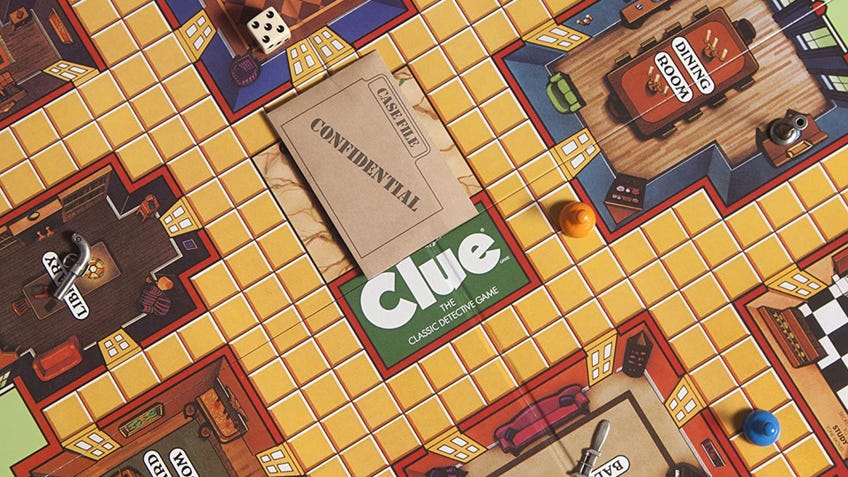10 best classic board games that are still worth playing
No, not like Monopoly.
Board gaming has exploded in popularity over the past two decades, but the uninitiated still often express incredulity about the hobby because they associate it with entirely luck-based classic board games for kids like Candy Land or the brutal slog of Monopoly.
Yet real enthusiasm for board games is hardly a new phenomenon. While the hobby went through a renaissance in the ‘90s thanks to the advent of collectible card games and Eurogames, traditional board games have been around for millenia.
Classic board games
You don’t have to go back hundreds of years or focus on the newest releases to find a game worth playing. There are classic board games released in the 20th century that established genres and mechanics that changed the hobby - and continue to inspire modern titles.
Whether you like word puzzles, party games or scheming against your friends as you try to conquer the world, these are the best classic board games are still worth playing today.
1. Scrabble
Are you sure that’s a real word?
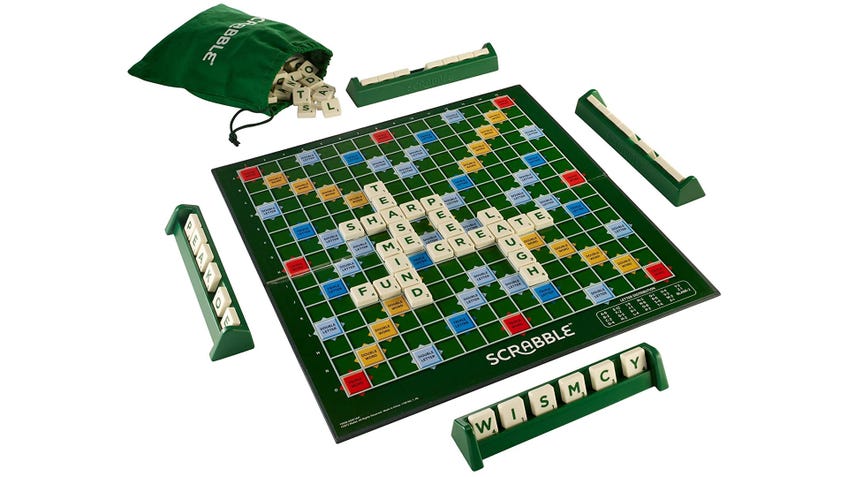
The inspiration behind a wide range of word games ranging from Boggle to Words with Friends, Scrabble was first released in 1938 and became a global phenomenon. Two to four players effectively construct their own crossword puzzles on the board’s grid using a set of randomly drawn tiles, building on the words others have already placed.
Scoring is based on the letters used in the word, with more obscure ones such as X and Z worth significantly more than vowels or common consonants like S and N. Ideally you also want to strategically place your high-scoring letters and words so that you can capitalise on the tiles that will double or triple the point values. You just need to watch out for the possibility that another player will tack an S onto your big score and also claim the points.
Scrabble obviously puts your vocabulary to the test and you have to watch out for spelling errors or made-up words. Other players can challenge what you’ve laid down and you’ll lose your turn if you were in the wrong. You should be pretty confident before you call someone out because you’ll lose your next turn if their play was correct.
Buy Scrabble on Amazon UK and Amazon US.
2. Jenga
Carefully move blocks without toppling the whole tower

A tense game of manual dexterity and physics, Jenga is a staple in family living rooms and bars. The concept is both simple and challenging enough that almost any age can enjoy it. Players take turns extracting a wooden block from a tower and then placing it horizontally on the top layer. As more blocks are extracted from the stable bottom layers, the tower becomes increasingly precarious.
The first few turns are usually pretty easy, with players jiggling loose blocks from the sides and easily placing them on top. But eventually those simple plays are all taken and then bolder strategies are required, like gently pushing through centre blocks. You’re allowed to tap a block to see how much give it has before committing to move it, but any contact with the tower runs the risk of toppling it over and dramatically ending the game.
The ratcheting tension inherent in the game made Jenga an ideal core mechanic for the horror RPG Dread, where challenges are resolved by moving blocks meaning everything the players do inherently becomes riskier as the game goes on. Oversized versions of Jenga are also a hit at parties, where the instability added by having a few drinks creates a whole new challenge.
Buy Jenga on Amazon UK and Amazon US.
3. Cluedo
Explore a mansion trying to solve a murder
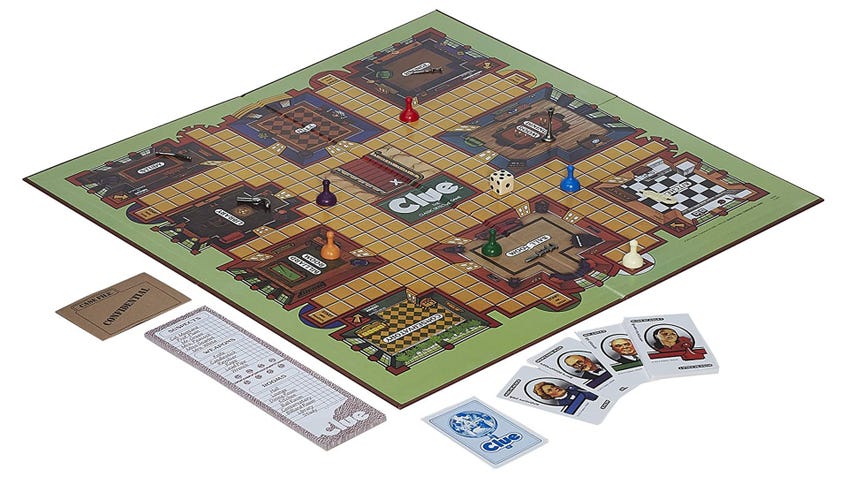
Cluedo, or Clue as it’s called in the US, established the genre of detective board games when it was released in the UK in 1949. Inspired by murder-mystery dinner parties and the works of Agatha Christie, the classic board game has players take on the role of people holed up in a mansion trying to figure out who the killer is, where the crime was committed and what weapon was used.
The solution to the mystery is randomly determined and hidden at the start of the game and the rest of the clues are randomly doled out to the players. As you move about the board, navigating posh confines like the billiard room and ballroom, you can throw out guesses about the crime and other players have to reveal evidence to prove you’re wrong.
Note-taking is encouraged to keep track of all the evidence you’ve seen or can guess at based on suspicions that were voiced and then dismissed. Once you’re really confident in your logic, you can actually accuse a suspect and consult the hidden cards to see if you were right. While the mechanics are pretty simple compared to modern versions of the genre, Cluedo is a quick and flavourful game perfect for a family night. You can also pair it with the hilarious 1985 film adaptation, which has three different possible endings.
Does this sound interesting to you? Then head over to our other page to learn how to play Cluedo.
Buy Cluedo on Amazon UK and Amazon US.
4. Taboo
Try to get your friends to guess a word without saying any of the forbidden clues
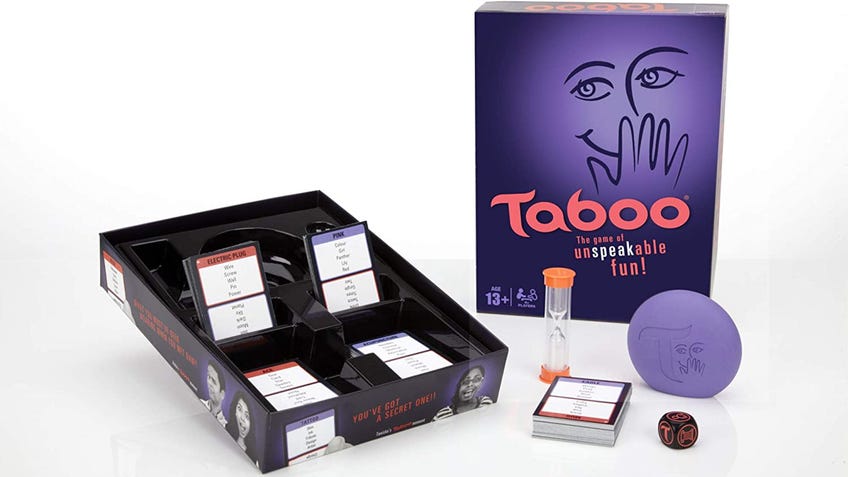
First released in 1989, the rapid-fire party game Taboo has players try to get their teammates to guess as many words as they can. The trick is that each card features both the word other players need to guess and a list of five taboo words that can’t be shared in any hints. So you’ll have the challenging job of trying to get someone to say “thumb” without using the prompts “finger,” “hand,” “drive,” “tack” or “suck”.
Typically you have someone from the opposing team keeping you honest by also looking at your cards and slamming a buzzer if you slip up, which ends your turn. The goal is to collect as many cards with correctly guessed words as possible. Like with many party games, you’re likely to have people who prefer to give prompts or to guess, but the fun comes in having to swap roles and discover just how challenging both can be.
While it’s the most recent classic on the list, the concept of Taboo has already been influential. You can find an electronic disc version of it in Catch Phrase and it’s one of the core mechanics in Salad Bowl, where it’s combined with Charades and Password.
Buy Taboo on Amazon UK and Amazon US.
5. Risk
Deploy armies and fight your friends to take over the world
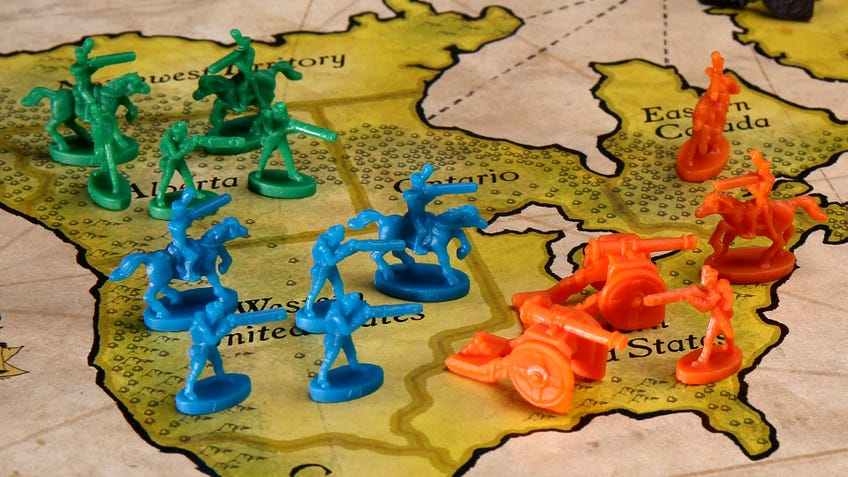
Fair warning: you shouldn’t play Risk unless you have both a full day and a group of friends who don’t hold grudges. Originally released in 1957, this cut-throat game of global conquest can get pretty heated as players gobble up territory and eliminate each other from the map.
Two to six players start by claiming territories around the board, setting up areas of influence and inevitably determining who they’re likely to start fighting first. Each turn, players reinforce their positions and can attack to try to knock out rival forces and take their territory. The more territory you hold, the more reinforcements you get, meaning you always want to be expanding to strengthen your own position and keep diminishing your opponents’ resources.
Of course you can’t fight on all fronts at once, which means players will often try to form alliances and non-aggression pacts with the implicit understanding that they’ll eventually turn on each other. When players have particularly fortified positions or dice luck goes poorly, the game can grind to a slog. While it’s worth experiencing the original, you may be better off trying one of the many variants like Risk Legacy - the very first legacy game - or science-fiction adaptation Risk 2210 AD.
Buy Risk on Amazon UK and Amazon US.
6. Axis & Allies
Team up to fight World War II in this complex tactical game
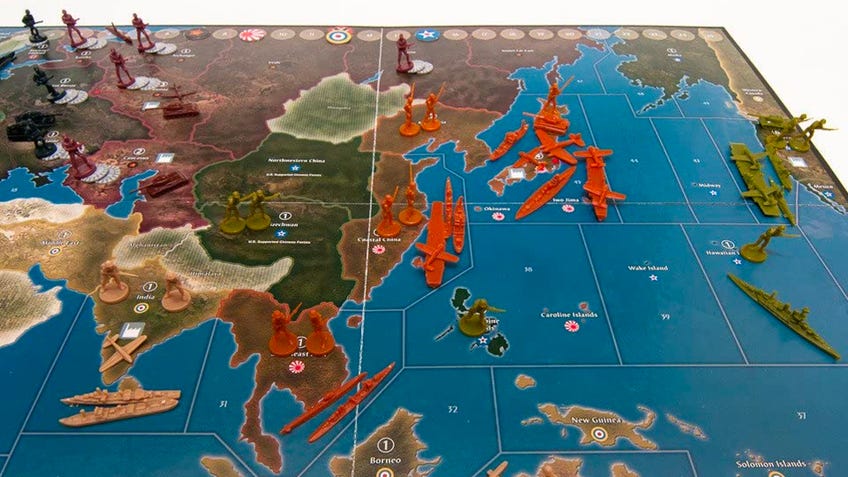
If you prefer more consistent alliances in your wargames, you might want to try Axis & Allies. First released in 1981, the game has two to five players take on the major nations of World War II, with the Allied Powers teaming up against the Axis. You then try to conquer territories by both playing out historic strategies and trying bold new ones.
The different countries have their own balance of units. Germany, for instance, has access to the most submarines but significantly fewer aircraft carriers than the US or Japan. Combined with geography, this means each player will have to master their own complex strategies as they manoeuvre ships, infantry and planes. Each unit has their own combat ability and cost to build, and Axis & Allies is a game about resource management as much as it is about taking out enemy territory.
Besides buying more weapons of war, players can also employ researchers to try to gain technological breakthroughs that can make your future units more powerful, unlock new tactics like paratroopers, or even make your factories more efficient so you gain more resources on future turns. There’s a ton to keep track of and the game can run for many, many hours so you might want to first try the digital version that makes it easier to both learn the rules and keep your board state.
Buy Axis & Allies on Zatu (UK) and Amazon US.
7. Scattergories
Test your vocabulary and creativity by using a letter across a variety of categories
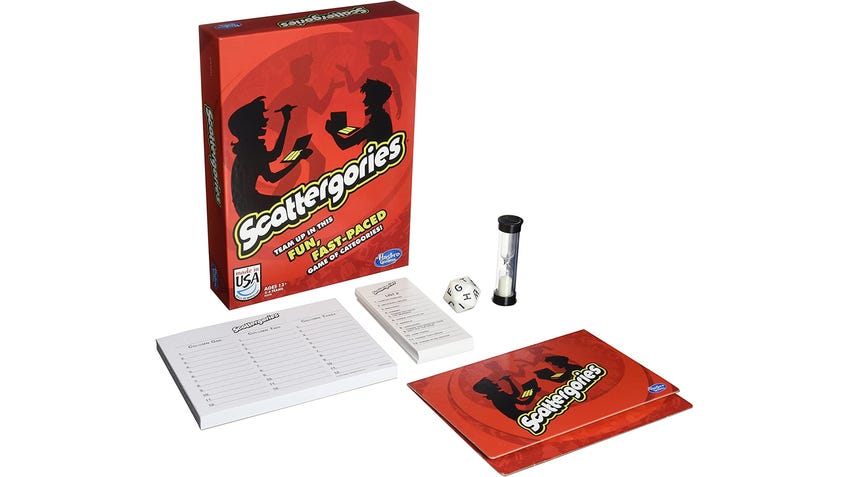
A party game with an intellectual bent, Scattergories starts with players rolling a 20-sided die with each face showing a different letter of the alphabet. They then get a sheet with 12 categories such as “insects” or “things that are cold” and have three minutes (or less if you want to really test your skills) to try to come up with an answer for each that starts with the rolled letter.
The time limit might tempt you to jot down the first thing that comes to your head, but you won’t score points for an answer if anyone else at the table wrote down the same thing. You can also earn bonus points for alliteration, like blister beetle as an insect starting with the letter B. If you’re stumped or the prompt is vague, you can write down something clever even if it isn’t technically accurate and the rest of the players can vote to decide if your answer is acceptable. For instance, you might be able to get away with the superhero Blue Beetle or just the synonym bug.
Once a round has been scored, you get a new letter and have to come up with picks for the same categories, repeating the process until three rounds have been played. Seeing the categories in advance might make you start mining the alphabet for options, but that just makes it more of a challenge to predict what your friends are likely to have come up with. The combination of vocabulary, deduction and creativity makes this 1988 classic board game stand the test of time.
Buy Scattergories on Amazon UK and Amazon US.
8. Diplomacy
Negotiate with and betray other players in this diceless game of conquest
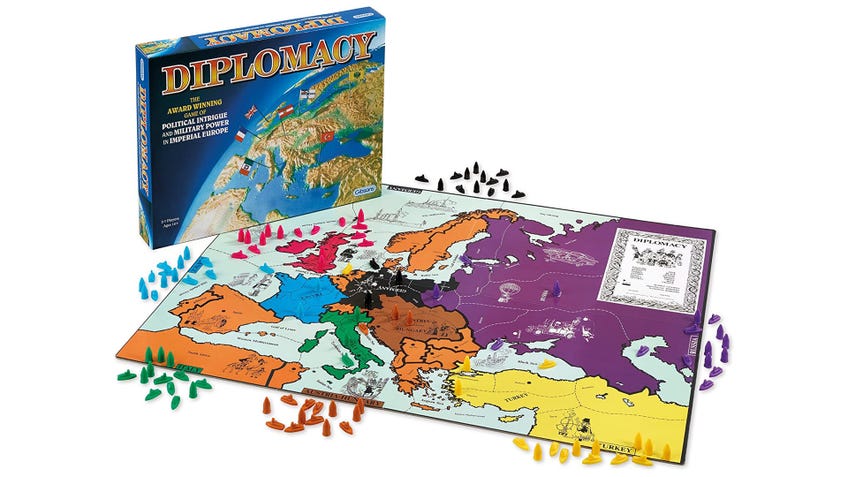
Forming and breaking alliances is a key part of Risk, but it’s the whole point of Diplomacy. First published in 1959 and said to have been a favourite of both US President John F. Kennedy and Secretary of State Henry Kissinger, Diplomacy lets two to seven players control the major powers of Europe in the lead up to World War I as they try to extend their reach across the map.
You’ll want to play in a building with plenty of rooms for sidebars as much of the game involves players negotiating with each other to figure out their moves before secretly writing down what they actually are going to do. Everyone then reveals their choices simultaneously and the actions are simply adjudicated. There’s no dice rolling - units just move or stand still and then depending on what sort of opposition they face might be forced to retreat or disband.
Diplomacy can take a ludicrously long amount of time depending on how heated the negotiations and recriminations get, so you may want to put time limits on the deliberations. The game has a devoted following, with multiple major conventions and tournaments providing ways to test your skills or just meet other lovers of its mix of tactics and social deduction.
Buy Diplomacy on Amazon UK and Amazon US.
9. Careers
Come up with secret life goals and pursue them to achieve victory
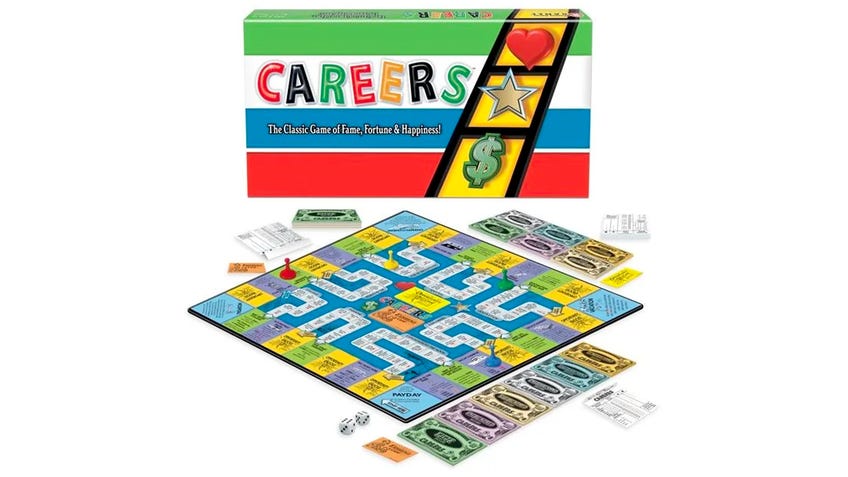
Careers was designed by a sociologist in 1955, and the game actually provides a clever look at the way Americans view success. Players start by choosing their own “success formula,” dividing 60 points among fame, money and happiness. The first person to meet or exceed all of those goals wins the game.
The key way to earn points is through work, picking a career path that aligns with your priorities. For instance, getting into big business will probably make you plenty of money while teaching is more likely to make you happy. You can keep moving through the same career or change things up to pursue different goals. You might also score some points outside of your job through hobbies or vacation.
There’s a fair bit of luck involved as you roll the dice to proceed and could find yourself losing turns or even your job. The game has also been revised multiple times to cut back on sexist language based on the assumption it was clearly just men pursuing these careers. Still it’s a much better version of The Game of Life as it pushes players to imagine what they might want their lives to look like and how hard it can be to have it all.
10. Pictionary
Draw your way to victory in the board game classic
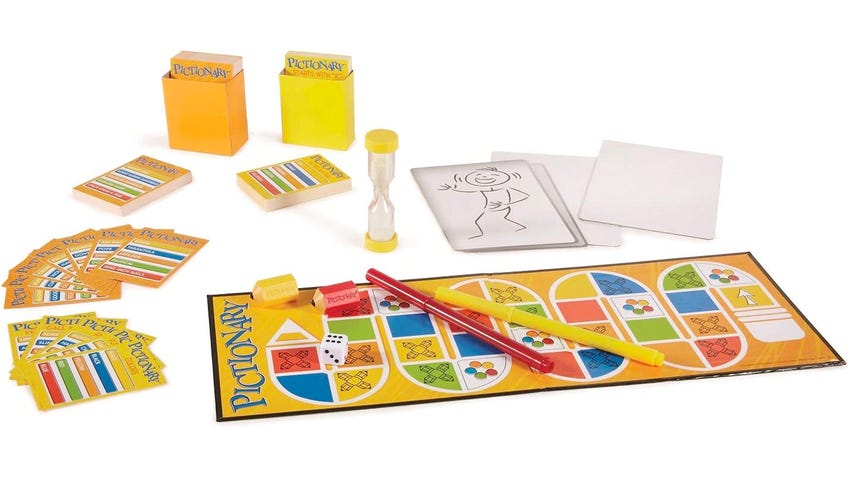
Pictionary is a party game so successful you don’t really need to buy it to play since the rules and concept are so easy to execute. It’s mostly a humorous way to put someone’s drawing skills on the spot as they try to get their teammate to guess what they’re illustrating before the one-minute timer runs out. Those prompts can be simple to illustrate, like “pony”, or more abstract, like “escape”.
Which clue you’re drawing is determined by the squares you land on while moving across a simple game board, with different colors representing categories like “action” or “object”. If you can get your team to correctly guess the prompt, you’ll roll a die and keep proceeding on the board with a different illustrator taking over. Otherwise the next team gets to take a turn. Some squares are all plays, meaning both teams are working at the same time, producing a chaotic free-for-all with the opportunity to steal control.
Getting to the final square, which is always an all play, and winning the round wins your team the game. Having a board and a box of prompts is certainly helpful in that it creates a clear end point and relatively uniform difficulty. Plus the game comes with convenient dry erase boards. But if you’re in a pinch and just looking for something fun, you can easily play Pictionary with a chalkboard, big pad of paper or whatever other art supplies you have around letting your players come up with their own prompts and ditching the board altogether.
